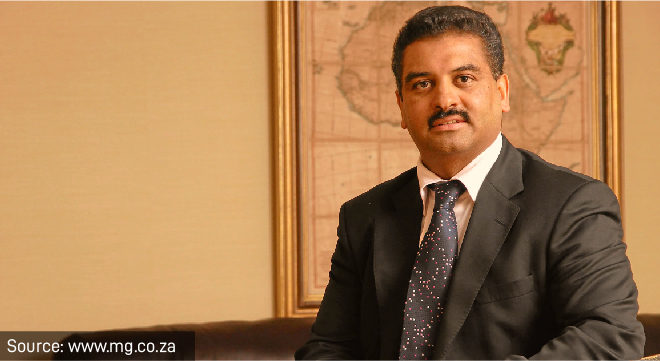The government’s unwillingness to involve the private sector is the main reason for the “glacial” progress in rolling out the infrastructure programme touted by President Cyril Ramaphosa two years ago, says the chairman of FirstRand, Roger Jardine.
In a forthright message in the company’s 2022 annual report, Jardine said, “the time has come to acknowledge that a developmental state (which some take to mean state-led growth and employment initiatives) for the twenty-first century must implicitly position the private sector appropriately as the engine for economic growth, investment and job creation. It is for government to create an enabling environment to make this happen.”
He said the state currently has neither the financial nor the human resources to meet the social and economic needs of South Africa.
“This is demonstrated by the fact that the country is struggling with the most basic underpins to economic growth and development, namely effective basic public services, an investor-friendly operating environment (also important for supporting small business development), appropriate investment initiatives, and skills and technical capacity. High-quality and reliable government services, such as a constant supply of electricity generation, reliable transport, and functioning healthcare and education systems, are not features of our daily lives.”
Where are the projects?
Jardin began his message by quoting a statement made by Ramaphosa in July 2020: “Extraordinary measures are required to return us to a path of sustainable growth. Central to this effort is infrastructure construction and maintenance, which is the flywheel for economic growth and large-scale job creation.”
Yet, he said, “it is hard to identify one government-led infrastructure project of any significance that has actually been executed”.
Although there was evidence that some parts of government were willing to involve the private sector in rolling out the development of infrastructure, “we have a long and difficult road to travel together”.
He said there have been some promising developments, particularly in the energy space, and these initiatives should be replicated in other network industries, because the country does not have time to waste.
“Again, government was slow, and the electricity grid was, and remains, on its knees before they embraced partnership with the private sector.”
Failing rail network and ports
Jardine drew attention to the impact on the economy of the deterioration of the country’s rail network, as well as the problem at South Africa’s ports, which “are among the most inefficient and costly in the world”.
He said the longer the port authorities take to establish partnerships with the private sector to help improve operations and address bottlenecks arising from old technology, ageing (and worn-out) infrastructure and inadequate container capacity, the bigger the risk that the market share recently lost to the likes of the Maputo Port Development Company in Mozambique will become permanent.
He said the country should, as a matter of urgency, use the revenue windfall from the strong, albeit fading, commodity cycle to transform the economy’s production capacity.
The consistent feedback FirstRand received from domestic and international investors was the urgent need for structural reform.
“The country has many world-class companies with highly respected management teams and compared to other emerging markets, strong corporate governance credentials. However, many are trading at low valuations. The drag on economic growth is a massive obstacle for investors, and until they see real commitment and action on structural reforms, they will not change their position,” he said.
Tough decisions, not social compacts
Jardine said South Africa requires a decisive approach to its national growth strategy.
“There is no room for interminable processes that only serve to delay the implementation of policies that are urgently required to kick-start our economy. In my view, a government is elected to govern and take tough policy decisions. In this regard, the government must abandon the notion that the process of social compacts will guarantee the efficacy of moving ahead with key programmes that will stimulate economic growth.”
He said the road to success required strong government/private sector collaboration.
“To this end, the government and the private sector should meet to agree on priorities and a plan to implement them. Indeed, this approach would be a powerful catalyst for the ‘extraordinary measures’ that the president believes will place us on a path of sustainable growth. There is no plausible plan for South Africa to prosper without the private sector playing a strong role.”
Jardine said FirstRand was committed to deploying its financial and human capacity to support the government in its endeavours.
“The group is proactively engaging to support systemic state-owned entities that own and control network infrastructure and industries that are critical to the economy and its recovery, and this extends to agencies responsible for the procurement of projects.”



